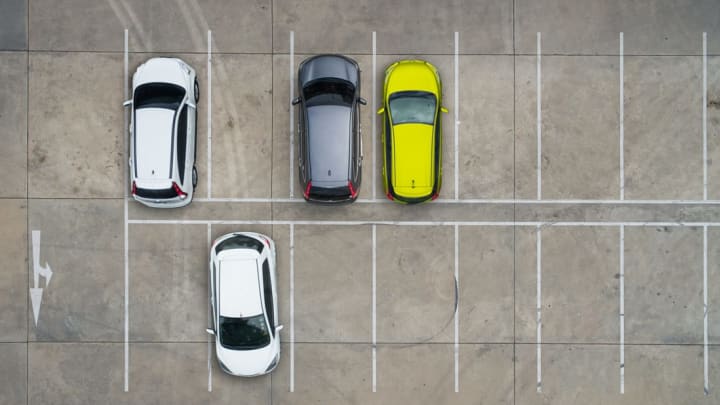When you’re driving around looking for a spot to park on tight downtown streets, you’re probably not cursing city planners for mandating too much parking space. (You’re probably thinking the opposite.) But while some areas, depending on the time of day, are inundated with more cars than spaces, for the most part Americans lead lives of parking privilege, surrounded by empty spaces they don’t need to use. By one estimate, there are eight parking spots for every car in the U.S. (Others say it's more like three, which is still a lot considering that number doesn't take into account home parking.)
Why does the U.S. have so much extra parking? A new video explainer from Vox (spotted by Arch Daily) has the answer. It’s because laws mandate it.
In the video, Will Chilton and Paul Mackie of the transportation research initiative Mobility Lab explain the rise of the parking meter, which was invented in the 1930s, and the regulations that soon followed, called mandatory parking minimums. These city laws require that those building an apartment complex or shopping center or store have to provide a minimum number of spaces in off-street parking for customers to use. The cost of providing this service is carried by building developers—giving the city a free way to get new parking without having to manage their street parking situation closely. Go to any suburb in America, and the parking lots you leave your car in are probably the result of these parking minimum rules.
The ease of parking in America isn’t a good thing—though it may feel like it when you slide into an open spot right in front of the grocery store. Experts have been calling for an end to zoning laws like these for years, arguing that excess parking encourages unnecessary driving (why take the bus or carpool if it’s easy to drive yourself and park for free?) while simultaneously making it harder to walk around a city, since parking takes up a ton of land that’s difficult to traverse on foot, interrupting the urban fabric.
These parking minimum regulations take very specific forms by building type, including number of spaces required per hole at a golf course, per gallons of water in a public pool, and per beds in a nursing home. Before you cheer for free, plentiful parking, let the experts at Vox explain just why this is a problem for cities:
[h/t Arch Daily]
